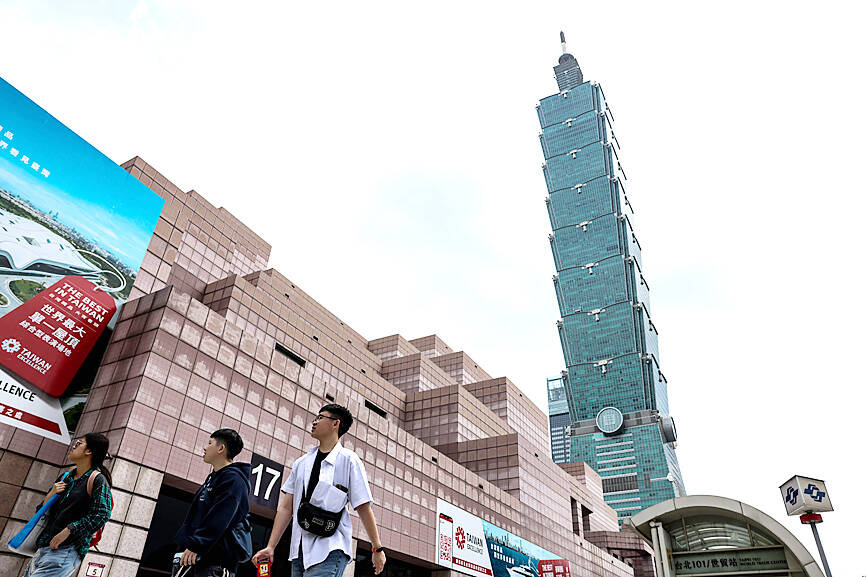S&P Global Ratings yesterday reaffirmed Taiwan’s sovereign credit ratings, maintaining its “AA+” long-term and “A-1+” short-term ratings with a stable outlook.
Taiwan’s “robust net external asset position, sound fiscal framework and strong monetary flexibility” continue to support its creditworthiness despite mounting economic headwinds from a weakening global trade environment, S&P said in a statement.
While geopolitical tensions remain a source of pressure on the nation’s ratings, they would not hinder the long-term development of its manufacturing industry, the agency said.

Photo: Cheng I-hwa, AFP
In addition, Taiwan’s advantages, such as its leading position in advanced chip manufacturing, sound fiscal position and strong net external assets, provide it with sufficient buffers to mitigate the impact of US tariffs on the economy, it said.
The agency’s latest assessment comes amid renewed concerns over global trade tensions, as US President Donald Trump’s tariff policy raises the risk of a broader trade war among major economies and casts a cloud on the prospects of global economic growth.
Economists said that Taiwan’s solid current account surplus and ample foreign exchange reserves, as well as its technology prowess and the central bank’s monetary flexibility, have prevented the nation from the negative impacts of capital outflows and external shocks.
S&P praised the central bank’s sound monetary management in ensuring ample liquidity in the domestic financial system and maintaining inflation at one of the lowest levels in Asia.
The agency also highlighted the relatively flexible exchange rate of the New Taiwan dollar and the smooth functioning of foreign exchange markets under the central bank’s stewardship, both of which help cushion economic and financial disturbances, the agency said.
As of the end of last month, Taiwan’s foreign exchange reserves stood at US$578.02 billion, up US$438 million from the previous month, while its current account surplus reached US$34.40 billion in the fourth quarter of last year, the central bank’s latest statistics showed.
S&P has maintained its “AA+” long-term and “A-1+” short-term sovereign credit ratings for Taiwan since 2022.

Taiwan will prioritize the development of silicon photonics by taking advantage of its strength in the semiconductor industry to build another shield to protect the local economy, National Development Council (NDC) Minister Paul Liu (劉鏡清) said yesterday. Speaking at a meeting of the legislature’s Economics Committee, Liu said Taiwan already has the artificial intelligence (AI) industry as a shield, after the semiconductor industry, to safeguard the country, and is looking at new unique fields to build more economic shields. While Taiwan will further strengthen its existing shields, over the longer term, the country is determined to focus on such potential segments as

UNCERTAINTY: Innolux activated a stringent supply chain management mechanism, as it did during the COVID-19 pandemic, to ensure optimal inventory levels for customers Flat-panel display makers AUO Corp (友達) and Innolux Corp (群創) yesterday said that about 12 to 20 percent of their display business is at risk of potential US tariffs and that they would relocate production or shipment destinations to mitigate the levies’ effects. US tariffs would have a direct impact of US$200 million on AUO’s revenue, company chairman Paul Peng (彭雙浪) told reporters on the sidelines of the Touch Taiwan trade show in Taipei yesterday. That would make up about 12 percent of the company’s overall revenue. To cope with the tariff uncertainty, AUO plans to allocate its production to manufacturing facilities in

COLLABORATION: Given Taiwan’s key position in global supply chains, the US firm is discussing strategies with local partners and clients to deal with global uncertainties Advanced Micro Devices Inc (AMD) yesterday said it is meeting with local ecosystem partners, including Taiwan Semiconductor Manufacturing Co (TSMC, 台積電), to discuss strategies, including long-term manufacturing, to navigate uncertainties such as US tariffs, as Taiwan occupies an important position in global supply chains. AMD chief executive officer Lisa Su (蘇姿丰) told reporters that Taiwan is an important part of the chip designer’s ecosystem and she is discussing with partners and customers in Taiwan to forge strong collaborations on different areas during this critical period. AMD has just become the first artificial-intelligence (AI) server chip customer of TSMC to utilize its advanced

Chizuko Kimura has become the first female sushi chef in the world to win a Michelin star, fulfilling a promise she made to her dying husband to continue his legacy. The 54-year-old Japanese chef regained the Michelin star her late husband, Shunei Kimura, won three years ago for their Sushi Shunei restaurant in Paris. For Shunei Kimura, the star was a dream come true. However, the joy was short-lived. He died from cancer just three months later in June 2022. He was 65. The following year, the restaurant in the heart of Montmartre lost its star rating. Chizuko Kimura insisted that the new star is still down